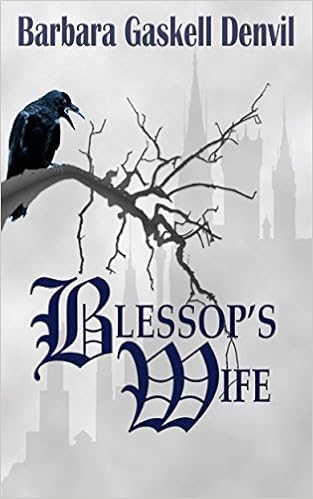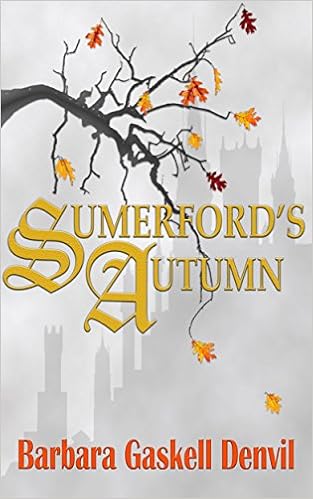Morning,
commies!
Say hello to Barbara Gaskell Danvil, an avid
world traveller and fellow historical novelist with a focus on the late Middle
Ages. Today she joins us to discuss her cross-genre
mystery novels set in 15th century England.
MJN: You were born in England and have lived in
various parts of Europe before settling in Australia, and yet your novels are
set in your native England. You speak Italian as well. Here's something I
lifted from your site, "You cannot be a minimalist in Italian."
My creative writing professor kept saying "English is the diction of
fiction. Use harsh, terse Anglo-Saxon words as much as you can. Avoid words
with Latin root."
BGD: It is a
hot Australian afternoon and the cicadas are calling so loudly, that I cannot
hear the music CD I’m playing. The warm breeze through the open window carries
a gentle waft of perfume from the garden; lilac blossom, rich jasmine scents,
and the first sweet aroma from the rose bushes. And yet, snuggled warm in my
head are the smells of medieval London, the harsh echo of footsteps across the
wet cobbles, the flickering suggestion of an oil lamp from behind a casement
window, and the sound of the last bell tolling from St. Martin-le-Grand,
announcing the closure of the city gates for the night.
So my imagination is firmly glued to old London, and I
can see those streets in my head. I dream of them, I walk them, I smell them.
It is instinctive for me to set my novels there, against a background I know just
as well as the rolling country scenery through my big bright Australian window.
I agree with your professor. The English language
combines the fluid beauty of Latin-based emotion, with the opposing beauty of
stark Anglo-Saxon practicality. That suits me just fine. I can use both, and
appreciate those diverse extremes, for that, to me, is how the history of the
British people came into being.
MJN: I personally separate the Late Middle
Ages into before the discovery of the New World and after. Blessop's Wife is
set in 1480s, at the tail end of that "before 1492" era. It was a
time of technological and ideological turnover, with the introduction and
popularization of the printing press. Can you tell us about some of the
revolutionary movements that were happening in Europe at that time?
BGD: The true
Renaissance of great art and the adoption of realism and perspective in
panting, was taking place in Italy at that time, whereas France was fairly
stuck in the business of international intrigue and domestic dominance, and
Spain was getting rid of the Moors and developing the religious intolerance of
the Inquisition. England was expanding her international trade, the swell of
prosperity and the rising comfort of the new middle classes. Elements of the
Renaissance brought waves of enlightened thinking into England at that same time,
with a new recognition of justice, moving ever further and further away from
the old outworn system of medieval feudalism. It was an exciting and
inspirational time worldwide, but I believe your own example of the printing
press was the most exciting of all. It changed everything. That influence
spread far and wide. Personal education became possible, mass availability of
knowledge was born, and the striking beauty of the book became a widely
accepted delight. Previously books had been principally (although not
exclusively) religious, and extremely expensive. Only the titled wealthy could
afford such luxuries. But Caxton’s invention gradually brought books within the
reach of many, and fiction such as King Arthur, the Green Knight, and Chaucer,
could be enjoyed by ordinary folk. The growth which sprang from this was huge
and exciting.
MJN: It's no secret that English in the 15th
century was different from contemporary English, but not to the point of being
unrecognizable. This is not the English of Chaucer, but it's not
Elizabethean either. When you write dialogue, do you ever face the
dilemma of whether make the language historically accurate or translate the
content into something more contemporary?
BGD: This is an
interesting question – but a little hard to answer without becoming too dull
and detailed. The fact is – although (exactly as you’ve pointed out) the
language of the late 15th century was not as different from our own
as Chaucer’s delicious follies, – if I truly wrote dialogue as it would
actually have been spoken, then very few readers would find it an easy or entertaining
read. A major translation into understandable modern English is essential for
simple comprehension.
Some nod to the era should be included, but I dislike the
artificial ignorance of unnecessary ‘thee’ and ‘thou’ usage so I make every
attempt to avoid any ‘historical pretence’ in dialogue. My characters therefore
speak basic English – but there’s a ‘but’! I also very strictly omit any modern
slang, Americanisms, references to modern jargon concerning scientific
knowledge, psychology or other subjects which would certainly not have existed
back then, and even avoid words which sound particularly out of place with this
era of history. It’s a personal choice. I do sometimes include 15th
century words when they seem appropriate. Like most authors of historical
fiction, I have my favourites. Yet my dialogue may seem too modern to some
readers, even though they wouldn’t understand it if I wrote in accurate 15th
century English.
So the question is whether to modernise entirely –
partially – just a little – or go all the way!
In the end my choice is to concentrate on characterisation
itself and therefore the dialogue is a way of individualising each one, and
that actually rules my writing far more than the historical era.
MJN: Your novels can be described as cross-genre.
They contain elements of adventure/action as well as romance. Some publishers
are looking for manuscripts in which one element prevails, which makes them
easier to market. Personally, I think that the elements feed from each
other. Wherever you have adventure, you are going to have romance.
BGD: Thanks,
Marina, and I agree. When my novels were published in Australia by the major
publishing house Simon & Schuster, they were marketed as historical
fiction, but the covers were somewhat over-romantic. I had no complaints, but I
do wonder if avid readers of romance might find my books somewhat more
adventurous than expected. I am fascinated by history and I sink myself into
the past as I write. Romance is an important theme in every novel, but it
cannot stand alone. My characters lead varied and dangerous lives, they
interact with the tumultuous historical events of the period, and they overcome
many obstacles before they can pursue the romance of their choice. My books
tend to be longer than most, covering this multi-faceted genre, and I keep a
fast pace. That means more than simple sweet romance alone. I think you are
quite correct to say that adventure and romance feed from each other. After
all, even in my own life I have found that romance is the greatest adventure of
all.
MJN: Let's talk about the covers. All three
novels feature the same background image and the same branch in
the foreground. Based on the varying condition of the foliage, I assume
you meant to indicate various seasons? Do you intend to have your novels
perceived as a series?
BGD: What an
interesting idea. Thanks, Marina. Actually although my covers follow a similar
theme, it is not the seasons that inspires them, but my own belief in the great
family tree of humanity. One small branch combines my covers, but this
represents the tiniest limb of our combined inheritance from the past. I see
history as the foundation of all our lives. Hence the reaching fingers of the tree.
My novels all tend to be set in England during the latter
half of the 15th century during the reigns of Edward IV, Richard
III, and on into the dawning of the Tudor dynasty. However, the stories and
characters are entirely separate and only references to the genuine historical
characters occur in more than one book. My fictional characters are all quite
different.
Not a series then. But certainly there are sufficient
similarities of background and genre, and so I hope anyone reading and enjoying
one of my books would also enjoy the others.
I have a new historical fiction due to be published early
in December and I’ll follow the same basic cover design with that too – I love
getting into the details of those designs.
Thanks for talking to me about my work, Marina. It’s been
most interesting. My inspiration continues uninterrupted and as long as it
does, I shall continue to write. My three published novels are now available
worldwide in both printed paperbacks and digital ebooks, all on Amazon, and my
next book will be out soon.



Fantastic interview - totally agree re dialogue. I probably err towards the too modern at times, but for me dialogue is about pace and immediacy.
ReplyDeleteThanks Anna - excellent point. It's characterisation that matters most with dialogue.
ReplyDelete